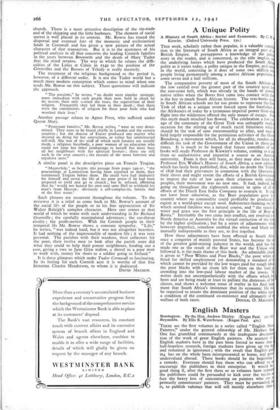A Unique Polity
A History of South Africa : Social and Economic. By C Kiewiet. (Oxford University Press. iss.) This work, scholarly rather than popular, is a valuable come tion to the literature of South Africa as an integral part of . British Empire. It presupposes a knowledge of the pola: story in the reader, and is concerned, as the title implies, the underlying forces which have produced the South Afri polity as it exists today, a polity unique in the Empire, and ind in the world, consisting as it does of some two million people living permanently among a native African population some seven and a half millions.
The comparative poverty of most of the South African sr. the low rainfall over the greater part of the country apart the east-coast belt, which was already in the hands of powe native tribes when the Boers first came into contact with tit is the key to much South African history. The text-books in in South African schools are far too prone to represent the G Trek of 1836 as a unique event forced upon the forefathers the Afrikaners of today by a tyrannous imperial power from w flight into the wilderness offered the only means of escape. Fr this myth much mischief has flowed. The celebration a few ago of the centenary of the Great Trek was unhappily made occasion for the stirring up of much racial bitterness whicl- should be the task of sane statesmanship to allay, and must, held largely responsible for the pernicious activities of the ON. Brandwag, a movement which, for all its absurdity, renders in difficult the task of the Government of the Union in these gri times. It is much to be hoped that future compilers of Sc books will study Professor de Kiewiees volume, coming as it d from so authoritative and impartial a source as an Amen university. From it they will learn, as they may also learn f Professor Eric Walker's History of South Africa, a new edition which has lately been published, that, while no doubt the Tre of 1836 had their grievances in connexion with the liberation their slaves and might resent the efforts of a British Gover to impose the rule of law upon their relations with cobo peoples, their movement was no new one. It had, indeed, going on throughout the eighteenth century in spite of all efforts of the Dutch East India Company to restrain it. It co not have been otherwise, as the Boer population grew in country where no commodity could profitably be produced export at a world-price except wool. Subsistence-farming on which seemed limitless was a natural course, and "the search. water and grass was the first principle in the life of Boer Bantu." Inevitably the two came into conflict, not resolved as North America or Australia by the virtual extinction of the lo by the higher civilisation ; but by a series of adjustments whi however imperfect, somehow enabled the white and black ra mutually indispensable as they are, to live together.
How these adjustments have been effected as South Aft; once a congeries of mainly pastoral States, has become the of the greatest gold-mining industry in the world, and has made one as the result of the Boer war and the Union W followed it, is the main theme of this book. An admirable cha is given to "Poor Whites and Poor Blacks," the poor white fitted for skilled employment yet demanding a standard of which cannot be provided by the low wages paid for rough la the poor blacks with no room left for them on the land crowding into the low-paid labour market of the towns. T writer deals not unsympathetically with the efforts which hi been and are being made at least to palliate the distresses of classes, and shows a welcome sense of reality in his final hid: ment that South Africa's insistence that its economic life in be organised to secure the dominant position of the white race, a condition of the continued co-existence and ultimately of


























 Previous page
Previous page